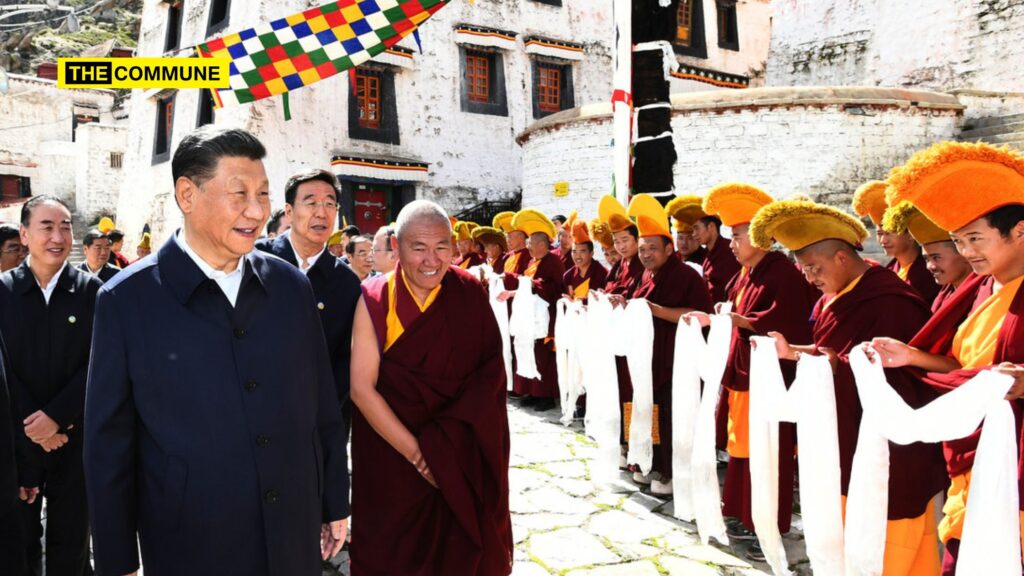Ongoing concerns continue to arise regarding the situation in Tibet, as reports indicate that Chinese authorities are forcibly confiscating property from Tibetan farmers in Rebgong County, Qinghai Province, under the pretext of constructing a hydropower dam. According to information from Tibet Press, local residents have been warned to cooperate and relinquish their land, with the threat of compensation being withheld for those who refuse. The order, issued on May 23, 2023, by the Langya village authorities, required seven villages in the area to relocate within ten days to facilitate the first phase of construction. This dam is a key project outlined in China’s 13th Five-Year Plan and is estimated to cover an area of 4.58 million square meters, with a construction cost of 245 million yuan.
Rebgong, also known as Tongren in Chinese, is a Tibetan-populated region in Qinghai province, situated in Malho (Huangnan). The affected area includes Tibetan settlements such as Shu-Ong-Kye, Shu-Ong-Nyi-tha, Langya, Malpa-Jam, Malpa-Kharnang-Kharshi, and Malpa-Chauwo. It is anticipated that the reservoir development will commence soon, compelling peasants to seek temporary employment in towns and cities if their properties are seized by local officials, as reported by Tibet Press.
The forced relocation of Tibetan nomads and farmers to urban areas, alongside the influx of Han Chinese settlers into Tibet, are part of China’s broader efforts to assimilate Tibetan minorities into the dominant Han Chinese culture. Infrastructure and development projects undertaken by Chinese companies in Tibet have resulted in frequent clashes with local Tibetans, who accuse them of improper land confiscation and disruption of their lives, as stated by Tibet Press.
These issues trace back to China’s invasion of Tibet in 1951, which has led to a continuous deterioration of Tibetan lives. Since the 2008 protests, more than 150 Tibetan monks have self-immolated, and numerous Tibetans have suffered torture, mistreatment, and death due to Chinese state repression. The erasure of Tibetan culture and ethnic identity by China is an ongoing systematic process. Relatives of Tibetan protestors are routinely subjected to harassment, imprisonment, denial of political and medical rights, and even death if perceived as a threat. The treatment of nomadic herders in Tibet has been particularly harsh, with over a million forced to leave the grasslands under the pretense of environmental protection, as reported by Tibet Press.
China’s tight grip on Tibet extends to political re-education camps and the suppression of any social activism, aiming to dismantle traditional leadership at the grassroots level. Tibetans associated with dissidents face severe consequences, including the loss of political rights, restricted access to jobs and healthcare, and constant surveillance facilitated by an extensive database. China’s United Front Works Department plays a significant role in subverting opposition both within China and overseas, using tactics such as misleading ethnic minorities about their right to self-determination and establishing government-sponsored NGOs to portray a positive image of China’s human rights record.
China’s attempts to manipulate international organizations, including the United Nations, have raised concerns. Chinese NGOs have reportedly falsified data in UN committees to defend China’s actions and human rights violations. The absence of the rule of law in China is evident through incidents like the crackdown on lawyers and the handling of the Covid-19 pandemic. UN reports have highlighted the separation of nearly one million Tibetan children from their families and their forced enrollment in residential schools, where they are subjected to Mandarin education, CCP ideology, and the erasure of Tibetan identity and culture.
The intentions of the Chinese Communist Party in Tibet are clear—they aim to Sinicize the region and its people, posing a significant threat to the Tibetan identity. It is crucial for Tibetans worldwide to unite and support their compatriots in Tibet to prevent the assimilation of Tibetan culture into Han China before it becomes irreversible.
Click here to subscribe to The Commune on Telegram and get the best stories of the day delivered to you personally.

